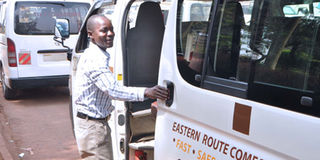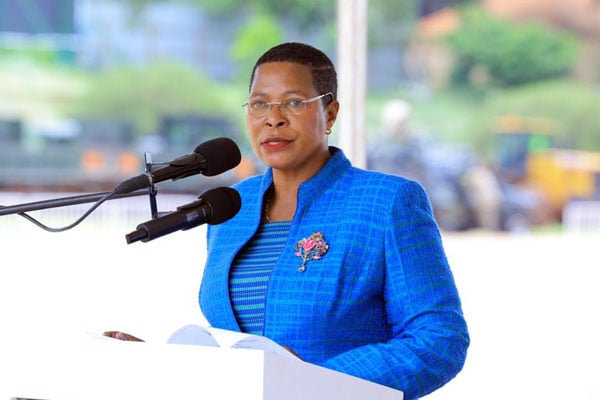Transport startup offers new twist to business

Mr Micheal Okech, founder of O-Express, a commuter taxi startup, opens the door. This business operates in such a way that passengers have to book a seat through a phone call or online. PHOTOS BY ERONIE KAMUKAMA
What you need to know:
- For the last seven months, coffee trader Micheal Okech has been changing the way people experience public transport along the Eastern Uganda route, particularly in commuter taxis, Eronie Kamukama explores.
For about five decades, white commuter taxis marked with blue stripes have traversed the country’s towns, picking passengers along roads and others, waiting for their passengers either in the old or new Taxi Park.
But for the last seven months, coffee trader Micheal Okech has been changing the way people experience public transport along the Eastern Uganda route, particularly in commuter taxis commonly known as Kamunye.
Mr Okech is using O-Express, a commuter taxi startup he founded to pick passengers from a place of convenience.
“If you are travelling to Mbale, you have to come to town or the old taxi park. You have to go through traffic jam and even pay money for that. So, we reserve space and pick passengers. Along Jinja road, our pick up points stop in Mukono and after that, we proceed to our destination so we are creating convenience for passengers,” Mr Okech says.
But the company is offering a new twist as passengers have to book a seat through a phone call or online.
Booking
“The booking avenues are basically phone calls, Whatsapp group and a Facebook page,” Mr Okech explains, “What creates a difference is that we have branded our taxis, passengers can always get back to us which is different from usual taxis where it is a one-off interaction with the taxi.”
Unlike what we are used to, Mr Okech has also created schedules for the taxis. He admits the company has no control over time of arrival because of unpredictable traffic flow and bad roads that create delays for most passengers that plough that road. But departure hours are followed regardless of passenger numbers because of the need to eliminate the issues that prompted him to start this kind of business.
“As a coffee businessman, my products are in Mbale and the market, in Kampala. I have travelled on this road and seen too many problems with public transport such as the delays caused by looking for passengers, discomfort, failure to trace lost property, harassment of passengers, exchanging passengers halfway the journey. I thought I could tap into the sector to serve people better,” Mr Okech says.
That was the thought in late 2017. It took another year to operationalise the business as he waited on resources and research to give him a go-ahead. Part of the findings was that people prefer to travel in the night. This informed the decision to schedule the first trip, a four-hour journey from Mbale as early as 2a.m and that from Kampala as early as 4a.m.
Investment
When he finally started, he invested Shs150m to purchase two commuter taxis and office space in Mbale and Kampala. Today, O-Express does eight trips on this Eastern route with four taxis on the road. Mr Okech describes his typical customers as corporate and businesspeople although his target was for everyone in the market to use the service since prices are slightly different from those charged by unbranded commuter taxis. Time is not a luxury that businesspeople or corporates can enjoy in a busy town. At first the company thought it could charge a little more than ordinary taxis.
“They are the ones on Whatsapp but also they want to move on time. An ordinary person does not mind using a taxi that charges Shs15,000 to Mbale but there is inconvenience they face because the taxi has to look for passengers,” Mr Okech says.
Costs
A trip to Mbale costs Shs20,000 for passengers. Couriers are charged according to the nature of the package. Transporting a simple envelope costs Shs5,000. But if you are sending a laptop, It costs Shs10,000 because of the risks involved.
Challenges
Business, he admits, has been tough as finding capital for more investment and drivers skilled in good customer care and passenger safety has been difficult. However, the biggest challenge was from players in the same market.
“There was sabotage from other taxi drivers whose argument was that we are not supposed to operate taxi business, that we should join them since they have their own drivers who should drive our taxis. It took us time to engage them after they attacked and vandalised our offices in Mbale. We went up to Police and also engaged Ministry of Transport for guidance,” Mr Okech says.
The dispute has since been resolved. From transporting five people from Mbale to Kampala, it seemed a costly venture at first. The innovation seems promising and is expected to change the way public transport is viewed. Numbers of passengers travelling from Kampala to Mbale are still low while the company cannot meet demand for those travelling from Mbale to Kampala.
“People begin booking three days to travel and they choose their preferred seats since each is numbered,” Mr Okech says.
He believes this mode of operation will convince people who have in the past given up on transport by commuter taxis because of their shortcomings.
The response from the market will be better if competing commuter taxis embrace this kind of innovation.
Plans
The target is now to have at least 10 commuter taxis on the road by the end of the year. In two years, it should be covering both the eastern and northern routes.
“We need to go to Tororo, Soroti, Lira because the demand for transport in these areas in really high. Still, we need a contact office, personnel, cars and with this step, it involves a lot of wear and tear for the cars,” Mr Okech says.
“As a coffee businessman, my products are in Mbale and the market, in Kampala. I have travelled on this road and seen too many problems with public transport such as the delays caused by looking for passengers, discomfort, failure to trace lost property, harassment of passengers, exchanging passengers halfway the journey. I thought I could tap into the sector to serve people better,” Micheal Okech, coffee trader and founder of O-Express, a commuter taxi startup
Partnerships
The company is partnering with banks for some of these investments but he says one must have a good financial status to acquire more funds. He must show that the company is profitable.
On the other hand, even with bank credit available, he is treading carefully.
“I must evaluate myself. If I go in for a loan with these high interest rates from these Ugandan banks, will I be able to sustain or go into hiding? So we are assessing the need for it and how we can finance the loans. Some people want to partner with us but am taking my time to avoid getting a partner who is just after getting returns within days,” Mr Okech concludes.




